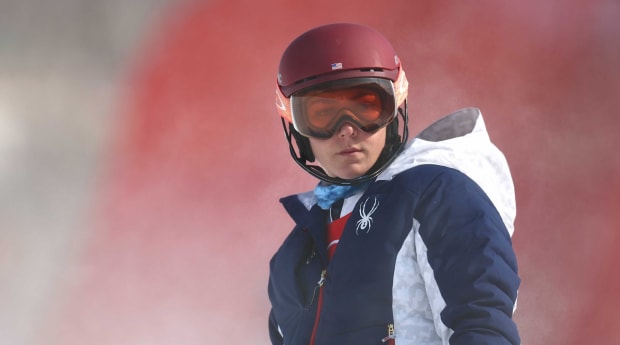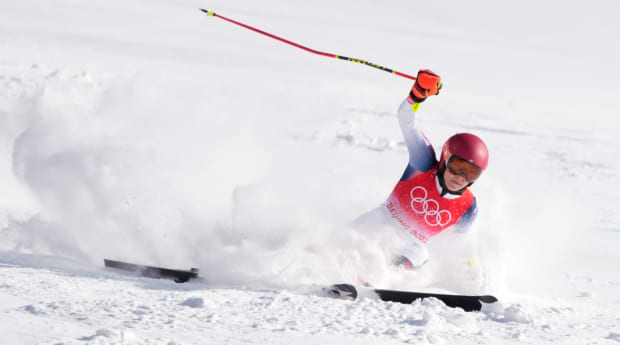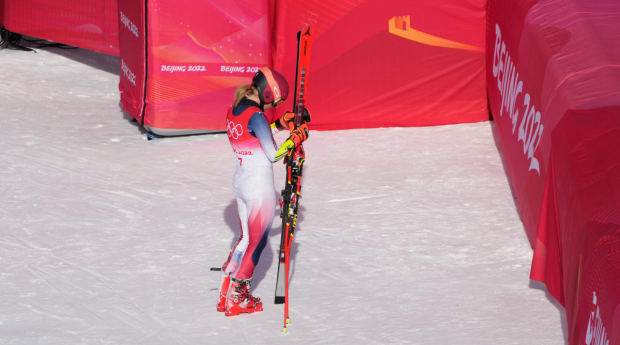It’s hard not to make the comparison between the two athletes. But after many got the gymnast’s story wrong last summer, let’s not make the same mistakes as the skier's Olympic campaign continues.
BEIJING — Mikaela Shiffrin is struggling on the mountain and off, and she needs to figure out which came first. Did she miss gates in the slalom and giant slalom because she is struggling mentally, or is she struggling mentally because she missed gates? These are deep questions that no skier wants to ask, let alone in the middle of the Olympics, but Shiffrin has to answer them for her own sake.
The 26-year-old is scheduled to ski the Super-G here Friday, and it will truly be a victory if she can just finish her run. She was never a medal favorite in this race anyway. What Shiffrin needs, as ridiculous as this sounds, is a physical reminder of how well she can ski.
The comparison to Simone Biles in Tokyo is so obvious that it would feel weird not to make it. Once again, the premier athlete in her sport, perhaps the best ever, is unable to complete tasks that are normally simple for her. The circumstances are not exactly the same, but as the Shiffrin saga continues, let’s try not to make the same mistakes so many people made with Biles.

Simon Bruty/Sports Illustrated
A lot of people got Biles’s story wrong last summer. Some were disingenuous, racist or both, of course—ripping a Black superstar for not being the tough patriots those people on their couches claimed to be. But many people who professed to empathize with her got it wrong, too. They said Biles was taking a stand for her mental health, and that she withdrew from Olympic gymnastics events because she refused to acquiesce to society’s expectations for her—but that is what they wanted to see.
They missed the point. Biles did not really choose to sit. She literally could not bring herself to perform. If she could have, she would have. She had trained so hard for the Tokyo Olympics. She didn’t do that as part of some elaborate plan to take a stand for mental health. She did it to compete, like any other athlete. She sat because she felt she had no other option. A gymnast who competes when in the frame of mind that Biles was in is endangering herself.
Should we feel for Biles? Of course. Did she inspire millions? Absolutely. Biles owned her mental health challenges and embraced the public dialogue, and that is to her eternal credit. But that isn’t why she chose to sit.

Eric Bolte/USA TODAY Sports
Let’s try to be smarter with Shiffrin, and acknowledge the nuance of the situation. After the slalom, Shiffrin seemed baffled by what had happened—“Honestly, I’m at a loss,” she said—but we can say with confidence that Shiffrin, like Biles, desperately wanted to perform at her best.
Biles often battled the sense that she was just performing for others, and it wore on her. Shiffrin is acutely aware of how others perceive her, but she also takes failure so hard and so personally. One key difference here: Biles was so dominant in her sport that winning almost didn’t feel like an achievement. Shiffrin is one of the best alpine skiers ever, but nobody dominates skiing like Biles dominated gymnastics.
Biles seemed to forecast her troubles last summer when she talked about the joyless challenge of doing what the world just assumed she would do. Shiffrin has been open about how much she cares, how much the pressure gets in her head, and how her father’s death has affected her emotional equilibrium. Yet in the cases with both athletes, it was hard to believe the storm was coming until it hit. Biles and Shiffrin are just so incredibly good at what they do. Surely, one figured, they would find a way to peak for the Olympics.

Andrew P. Scott/USA TODAY Sports
There are various plausible theories about what happened to Shiffrin this week. Perhaps the pressure was just finally too much. Maybe she found it hard to find the proper mental approach while competing in China under strict protocols before a limited audience. (One reason Biles struggled in Tokyo was that there were no crowds, leaving her too much time with her thoughts. But again, the sports are different and so are the athletes.)
Maybe Shiffrin was actually in a great mental place entering her first race, the giant slalom, and she just made a rare physical mistake—and then she started to break mentally. I thought she might be too cautious in her first slalom run because of what happened in the giant slalom; she said afterward she was determined to be aggressive, and maybe she overdid it.
It is also possible that her dad’s absence hit Shiffrin even harder this week than she expected. Grief can play a dastardly game of hide-and-seek: It makes you think it’s gone, and then there it is again.
Maybe some combination of these factors—or others—caused Shiffrin to miss gates. These are all guesses for now. When Shiffrin finds the answers, she will almost certainly share them with the public; as bizarre as this week has been, it confirmed that Shiffrin will always be open about her struggles. But the answers might not come this week. She might need time, space, and a trip home, away from Olympic slopes.
In the meantime, anybody with a teaspoon of compassion should be rooting for Shiffrin. Not even to win. But just to ski. At some point, Shiffrin will tell the world what went wrong for her. For now, let’s hope something goes right.
More Olympics Coverage:
• Chloe Kim Avoids the Pitfalls of Pressure in Beijing
• After Infamous Mistake 16 Years Ago, Lindsey Jacobellis Finally Gets Her Olympic Glory
• Mikaela Shiffrin's Tragic Loss Gives Her Perspective After Latest Olympic Miscue